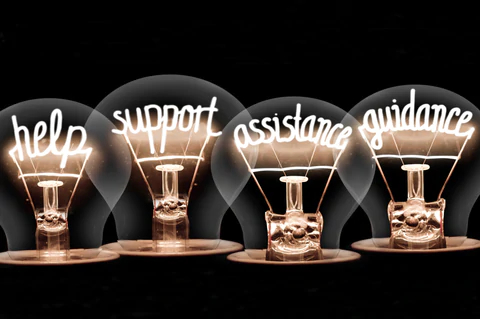Free delivery on orders over £50, only £4.95 under £50
Free delivery on orders over £50, only £4.95 under £50

Please note that all content on this website (including, but not limited to, copy, images, commentary, advice, tips, hints, guides, observations) is provided as an informational resource only. It is not a substitute for correct and accurate diagnosis, or recommendation, or treatment by a medical professional. Please ensure that you obtain proper guidance from your GP, or another medical professional. The information provided on this website does not create any patient-medical expert relationship and must not be used in any way as a substitute for such.
Allergies are the body’s reaction to a specific 'thing'. This 'thing' could be a chemical, a protein, or a food substance. Essentially, your body can develop an allergy to pretty much anything!
When your body is exposed to this substance, or 'allergen', your immune system kicks into high gear. This exaggerated immune response then causes your body to develop the symptoms indicative of an allergic reaction.
That being said, there are certain things that people are more likely to be allergic to, such as nuts and shellfish. People who have allergies to these types of substances tend to have more serious reactions and be allergic to more than one thing however, this is not always true.

Photo by Brand & Palms from Pexels
The most common allergy in the UK is hay fever, which is an unpleasant reaction experienced by some people to pollen.
You can be allergic to just about anything, but there are some allergies which are more common than others, including:
• Dust mites
• Animal fur, or skin
• Food allergies, in particular nuts, lactose, shellfish and eggs
• Insect stings, or bites
• Medicines
• Latex allergy
People who suffer with asthma and eczema are known to be more susceptible to allergies. These types of conditions can all be caused, or worsened, by immune responses. People who suffer with these conditions are known amongst health care professionals as 'atopic'. This just means that they are more likely to react to things than other people.

Photo by Anand Dandekar from Pexels
Remarkably similar to the fact that you can be allergic to almost anything, there is a whole spectrum of allergic reactions as your immune system comes into contact with the allergen, and then goes into overdrive, which generally causes swelling and inflammation. This reaction could be anywhere in your body, and the symptoms of an allergic reaction that you get will depend on where you get the response.
In hay fever, the inflammation is commonly experienced around the eyes and nose. This swelling causes your eyes to become watery and itchy, and your nose to become runny. The medical term for these symptoms in response to an allergic reaction is 'allergic rhinitis'. You might hear health professionals use this term interchangeably with hay fever.
People who have dust mite allergy, or allergies to animal fur may also only get these kinds of symptoms.
You might feel wheezy, tight chested, or short of breath. This is a serious symptom, and one to be aware of. If you experience this reaction in response to something new, or something you know that you are allergic to, you should immediately call emergency services on 999.
If you are going to get this symptom as part of an allergy, it will generally happen within an hour of being exposed to something, however the time between being exposed and showing symptoms can vary depending on the type of allergen you have been exposed to.
Being exposed to foods will generally cause symptoms within half an hour, insect bites within 15 minutes, and drugs within 5 minutes. Due to this variation in times, it can be difficult to identify what you have been exposed to and when. Even if you are not aware of what you have been exposed to, if you do get symptoms, you should not delay seeking medical attention.
If you get swelling of your lips, or tongue, or feel like your throat is closing over, it is important to call 999 urgently.
There are different types of rashes associated with different types of reaction.
If you are having an acute reaction to something, you might develop a bumpy red rash which 'moves' around your body. It can be extremely itchy and can come up in patches which then go away and then resurface somewhere else over a period of hours. This rash is known as 'hives', or your doctor might call it 'urticaria'.
People can often feel distressed when experiencing hives, due to the itch and appearance of the rash but unfortunately, there are not any quick fixes for it. If you get this symptom on its own, but are otherwise well, and you are not known to have any severe allergies, it is unlikely to cause you any harm. In most people, it will resolve on its own over a short period.
You can try taking regular antihistamines to help with the itch, or even a low dose steroid cream which can be purchased over the counter, or prescribed by your GP. Steroid cream should not be used on your face, or for longer than a week. If the rash persists for longer two weeks, it might be worth seeking further medical advice.
Most people who get Hives are never able to identify what they came into contact with to cause it. Although it can be caused by allergies, it can also be caused by other things including courses of antibiotics, viral, or bacterial infections, and even stress. If you get a rash with any other symptoms at the same time, then it is important to see a doctor.
Another type of rash seen as a result of an allergy is contact dermatitis. This is a local reaction on the skin due to prolonged contact with something. Classically, people get it from wearing bracelets, or watches, with nickel in them. It causes a patch of dry skin where the object has come in contact with the skin, but once the offending item has been removed, it will get better on its own.
It is possible to experience abdominal pain, cramps, diarrhoea and/or vomiting in response to an allergy. This reaction can be caused by inflammation around your gut in response to the allergy, but can also be caused by inflammation in the blood vessels which supply it. These symptoms can be important to take note of alongside any other symptoms listed above. If you do experience multiple symptoms, you should call 999 and seek medical advice.
When you get a severe allergic reaction to something, your blood vessels might start to dilate and leak fluid. This contributes to some of the symptoms above, but can also cause light headedness as your blood pressure begins to drop. Your heart will start to beat faster to compensate for this, and you might feel this as a pounding in your chest.
If you feel faint in response to an allergy, or this symptom happens with any of the symptoms above, lie down on the floor and raise your legs in the air. Make sure you, or someone who you are with, calls 999 and gets urgent help.
If you are intolerant to a food, it means that your body has trouble digesting it. For example, people with lactose intolerance cannot digest lactose, and this causes symptoms like abdominal cramps, pain and diarrhoea. The symptoms you get from an intolerance are experienced just in the gut, and this is what makes it different from an allergy.
No. If your symptoms are confined to one thing, like your gut, then you are not experiencing an allergy.
Common side-effects of medications include rashes and diarrhoea. If you have taken the medication multiple times before and have been fine, or do not get your symptoms until you have been taking it for a few days, it is unlikely that you have a true allergy. It is important to distinguish between the two things if you can. For example, if you say you are allergic to penicillin when all you get is diarrhoea when you take it, this limits the types of antibiotics that can be given to you.
Penicillin is an extremely good antibiotic and different types of penicillin are used for serious infections. By not being able to differentiate between an allergy and an intolerance, it could be that you are having antibiotics that are not as effective at treating an infection, when it would have been more beneficial to have penicillin, and put up with the side-effects. Of course, if you do experience these symptoms when taking a medication, let your doctor know.
It is common for people to never find out what they have had an allergic reaction to. If you have only had mild and infrequent reactions, like skin rashes that happen once every few years, you might not need any further investigations.
However, if your symptoms are more frequent and severe, or are impacting your quality of life, then your GP might send you to an allergy clinic. You might be asked to keep a food and symptom diary, where you note what you eat each day and when you get symptoms.
You may also be given a skin prick test. This is where your skin is pricked with the proteins from different kinds of common allergens, like animal fur. The clinician will then monitor you to see if you react to any of these allergens.

Photo by JZhuk on iStock
This depends on your kinds of symptoms. Generally, antihistamines are used as an initial treatment. You will be asked to take them when you are exposed to whatever causes your symptoms. People with hay fever will likely have to take antihistamines throughout the hay fever season.
There are different types of antihistamines. Some are long release which requires you to take one a day and others you have to take at multiple times throughout the day. The most common side effect is drowsiness, although some antihistamines will cause this side effect less than others.
If over the counter medications are not working, you can go to your GP. They may be able to prescribe stronger antihistamines.
For people who get really severe symptoms, you may be referred for desensitisation, which is a medical way of exposing you to whatever causes your allergy over a long period of time. This might not cure your allergy, but could improve your symptoms. It is, however, generally reserved for people who have severe symptoms.
Allergies such as latex allergies and allergies to certain foods can be managed at home by being aware of what different products contain. For example, making restaurant staff aware of a food allergy you have can help them ensure that your food does not come into contact with something that will cause allergic reactions.
For those who have a latex allergy, there are products available on the market that are latex free. Items that usually contain latex, such as gloves, are now commonly available in a latex free option.
Dust mites can also cause allergies. To combat this, products such as the AllerZip Mattress Encasement can be used to create a barrier against dust mites. Whilst these daily living aids are not a guarantee against allergies, they do help to reduce the risk of an allergic response.
Anaphylaxis is a serious type of allergic reaction. It generally happens very soon after exposure to an allergen, normally within the space of an hour.
People who are suffering from anaphylaxis may experience any of the symptoms above. They might also vomit, have abdominal pain, get a rash, have shortness of breath, swelling around the mouth, become light headed and even pass out. No one of these things means that you are suffering from anaphylaxis. However, if you get two, or more, of these symptoms together, this is a sign you are experiencing anaphylaxis and it is important to call 999.
If you see someone who you think is having this type of reaction, lie them on the ground and put their legs in the air. Call 999 and ask for an emergency ambulance. Do not get them to stand up and walk, as this can make things worse. Wait in a safe place for the ambulance to arrive.
It can be really difficult to tell the difference between a simple allergic reaction and anaphylaxis – even for doctors. If you have any concerns, it is important to seek immediate help, because anaphylaxis is a life-threatening condition which can progress in a matter of minutes.
It is common for people to think that if they have suffered only mild reactions to something previously, that they will continue to experience only mild reactions. This is not true. As your body becomes increasingly sensitised to an allergen, you might experience a more severe reaction the third time you are exposed to something than the first.
This can happen in children. A child can have had nuts a couple of times before and shown only mild symptoms, or none at all, then experience severe symptoms when eating nuts at a later point. It is important to take this type of reaction just as seriously as someone reacting to something they have never had before, because it could be anaphylaxis.
Anaphylaxis is treated with adrenaline. This could be given through an injection into your muscle, or into a line inserted into your vein (IV). Both work equally well, but you may require multiple injections.
People suffering with anaphylaxis are also required to have strong steroids and antihistamines intravenously. They will probably also be given fluids to try and keep their blood pressure up.
If you go to hospital with signs of anaphylaxis, you should expect a blood test. A specific blood test will be taken for something called mast cell tryptase. This is a protein in your blood which is released when you have a very severe allergic reaction. This test will then be repeated a few hours later to see if your levels have gone up, which would indicate an anaphylactic reaction.
Diagnosis in this way is important, because it means that you can get the right kind of follow up support. Testing helps identify what you might be allergic to, and how to treat it if you get it again.
An EpiPen or epinephrine injection is prescribed to people who get anaphylactic reactions to allergens. There are many different types of adrenaline injection, and depending on the brand, what we call them vary. We generally think of the “EpiPen” because of Hollywood films, where the adrenaline in these pens is called epinephrine. Another term for it is an adrenaline auto-injector. Allergy UK has produced this handy guide to adrenaline auto-injectors and how to use them.
Essentially it is a pre-filled syringe with a needle on the end. Inside the syringe is a dose of adrenaline. The pen will probably have instructions on the side of it, to show how to use it in the event of an allergic reaction.
There are some important things to remember when thinking about giving yourself a dose from your EpiPen:
1. Do not delay. If you have been exposed to something which you know causes you to have an anaphylactic reaction, give yourself a dose. There have been studies that show that people who die from anaphylaxis frequently have their EpiPens with them, and have not given themselves a dose. If you wait until you feel symptoms, it might be too late, so administer it straight away.
2. If your symptoms are still there, or come back, and you have a second pen, give yourself a second injection 5-15 minutes after the first.
3. If you have given yourself a dose, call 999 and go to A&E. Just because you feel fine now, does not mean that you are completely treated. Your reaction might come back, and you will need further doses if this happens. This is urgent, as you could deteriorate quickly. Do not drive.
4. Adrenaline is a pretty safe drug, try not to be too afraid to use it. It is a naturally occurring hormone in your body, and in a healthy individual is unlikely to cause any problems. If you think you may have a reaction, or are starting to get symptoms of one, this is far more likely to cause you harm than your EpiPen. Do not think twice, just give it.
You can see from this article that saying you have an allergy to something can mean a host of different things. It might mean you suffer from hay fever, with itchy eyes and a runny nose, or it might mean that your life is at risk every time you come into contact with something. The important thing to remember is that if you are suffering from only one symptom, like diarrhoea, or a rash, or itchy eyes, it is unlikely to cause you any harm. If you get more than one symptom, or you have shortness of breath, swelling around your lips and tongue, or feel light headed, then you need to seek urgent medical attention.
Severe reactions generally happen within an hour of being exposed to an allergen. Frequently, however, people are unaware that they have been exposed to something, so these symptoms might start on their own. If they progress rapidly, then make sure you call 999 and go to hospital for an assessment.

Photo by EtiAmmos on iStock
Allergy UK is a UK based charity dedicated to helping people who suffer with allergies. They operate a helpline and have an online chat function on their website for advice and support. They also have an eating out guide, where you can search restaurant menus for allergens, so you can be sure before going out for a meal that there will be something safe available for you to eat if you suffer with allergies.

Photo by Pixabay from Pexels
Medical terms are often baffling and difficult to fully understand. To help, we have listed some frequently used terms below.
Adrenaline – a naturally occurring hormone in the body. It is also a medication which is used for the treatment of severe allergic reactions
Allergen – a substance which produces an allergic reaction
Anaphylaxis – a severe and life-threatening allergic reaction
Atopy – a genetic predisposition to allergies. People who have asthma and eczema are said to have atopy, as they are more likely to suffer from allergies
Intolerance – unlike an allergy, when exposed to something which you are intolerant to, you do not produce an immune response. Symptoms are generally confined to the gut
Rhinitis – inflammation of the nasal passages
Urticaria, or hives – an itchy rash which can be caused by a number of things, including an allergy